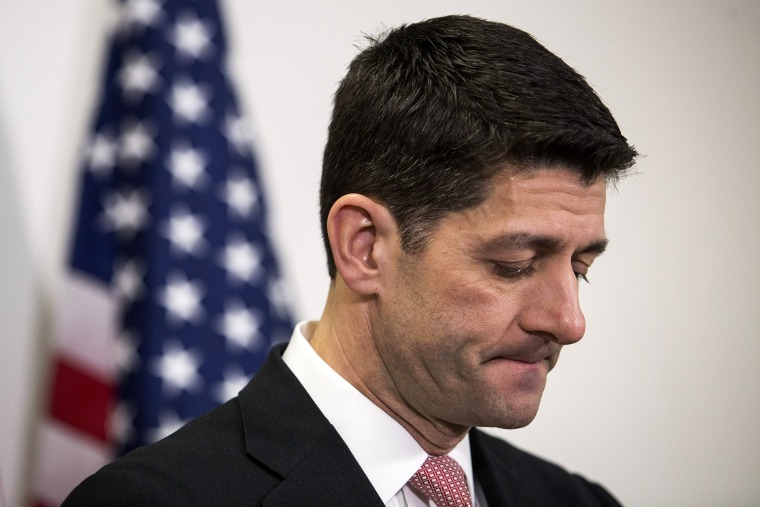Donald Trump hedged over the weekend when asked to denounce support from David Duke and other white supremacists, though he later blamed the quality of the ear piece and said he didn't fully hear the question. Whether or not one finds the explanation credible, the incident has caused many Republican leaders -- who aren't comfortable with the GOP frontrunner's candidacy anyway -- to offer public rebukes.
This morning, for example, House Speaker Paul Ryan (R-Wis.), who is officially neutral in the 2016 race, made his feelings clear.
"Today I want to be very clear about something, if a person wants to be the nominee of the Republican Party, there can be no evasion and no games, they must reject any group or cause that is built on bigotry. This party does not prey on people's prejudices. We appeal to their highest ideals. This is the party of Lincoln," Ryan said.
It all sounded quite encouraging, right up until the end of the Republican leader's appearance with reporters. Asked specifically about Trump and Ryan's general election plans, the House Speaker conceded he plans "to support the nominee" in the fall, no matter who it is.
And this, in a nutshell, helps capture one of the Republican Party's principal dilemmas.
Ryan's posture, while heartening at first blush, is burdened by flaws. The Speaker said all the right things about rejecting bigotry and appealing to Americans' highest ideals, but this is the same Republican leader who'll make no effort to restore the Voting Rights Act, and who continues to support Steve Scalise's leadership post despite the Louisianan's highly controversial background on race.
But more to the point, while Ryan seems uncomfortable with Trump's approach to race, the Wisconsin congressman isn't yet prepared to take meaningful action. Ryan said this morning that anyone who expects to be the Republican nominee must renounce bigotry, but in practical terms, what exactly does Ryan intend to do about it?
The House GOP leader says "there can be no evasion," but in the face of evasion, Ryan nevertheless intends to support his party's nominee -- even if it's Trump, the candidate engaged in the precise behavior the Speaker says he finds offensive.
Ryan added, in reference to his party, "We believe all people are created equal in the eyes of God and our government. This is fundamental, and if someone wants to be our nominee, they have to understand this."
OK, but what if they don't understand this? So long as Ryan plans "to support the nominee" anyway, what incentive does Trump have to adopt a more inclusive and respectful message?
